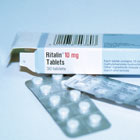Ritalin should be first drug choice for children with ADHD, finds study

Methylphenidate – commonly known as Ritalin – should be the first drug offered to children and adolescents with ADHD, according to a major study including more than 24,000 patients.
Researchers from seven countries, including the UK, USA and Germany, measured how effective and tolerable ADHD treatments are across different age groups, and recommended that methylphenidate should be the first drug offered for children and adolescents, while amphetamines should be offered to adults.
The paper, published in the Lancet Psychiatry, compared seven different oral medications for ADHD in children, adolescents, and adults, including amphetamines, atomoxetine, bupropion, clonidine, guanfacine, methylphenidate, and modafinil.
Using a literature search, the study involved 133 double-blind randomised controlled trials, with 81 in children and adolescents, 51 in adults, and one in both.
The analysis of efficacy was based on 10,068 children and adolescents and 8,131 adults, while the analysis of tolerability was based on 11,018 children and adolescents and 5,362 adults.
The researchers found that for ADHD core symptoms rated by clinicians in children and adolescents at 12 weeks, all included drugs were superior to placebo.
And for adults, amphetamines, methylphenidate, bupropion, and atomoxetine, were better than placebo.
Looking at tolerability, amphetamines were inferior to placebo in both children and adolescents and adults, and atomoxetine, methylphenidate, and modafinil were less well tolerated than placebo in adults only.
The authors wrote: ‘Accounting for all included outcomes, our results support methylphenidate in children and adolescents, and amphetamines in adults, as the first pharmacological choice for ADHD.
‘In fact, in adults, amphetamines were not only the most efficacious compounds, as rated by clinicians and by self-report, but also as well tolerated as methylphenidate and the only compounds with better acceptability than placebo.’
They continued: ‘In children and adolescents, even though amphetamines were marginally superior to methylphenidate according to clinicians’ ratings, methylphenidate was the only compound with better acceptability than placebo and, unlike amphetamines, was not worse than placebo in terms of tolerability.’
But study author Dr Andrea Cipriani, associate professor at the University of Oxford, said: ‘It’s important to note that the data available only allow us to compare the effectiveness at 12 weeks, when we know that both children and adults can be on these medications for longer. More research is needed into the long-term effects of medication.’
He added that despite this, the evidence from the study on methylphenidate and amphetamines is ‘robust, and should help inform clinical decisions’.
Researchers have previously warned GPs to be cautious about prescribing ritalin for ADHD, due to side effects such as sleep problems and loss of appetite, and said that many of the clinical trials showing its effect on ADHD symptoms were of a low quality with a ‘serious’ risk of bias.
Pulse October survey
Take our July 2025 survey to potentially win £1.000 worth of tokens

Visit Pulse Reference for details on 140 symptoms, including easily searchable symptoms and categories, offering you a free platform to check symptoms and receive potential diagnoses during consultations.










